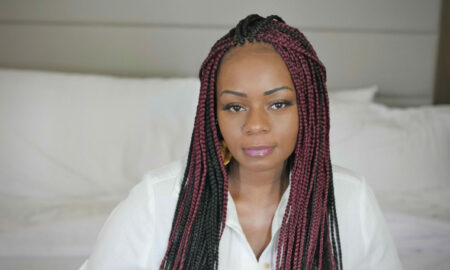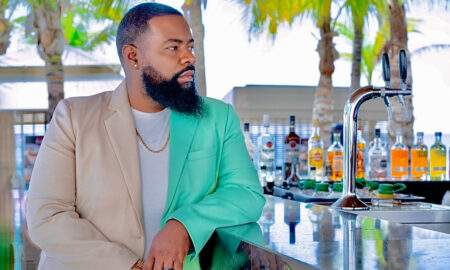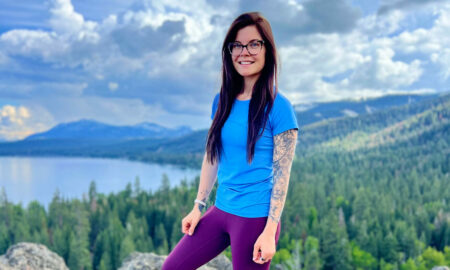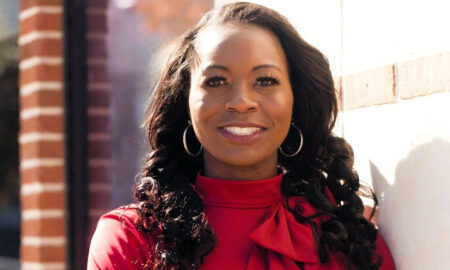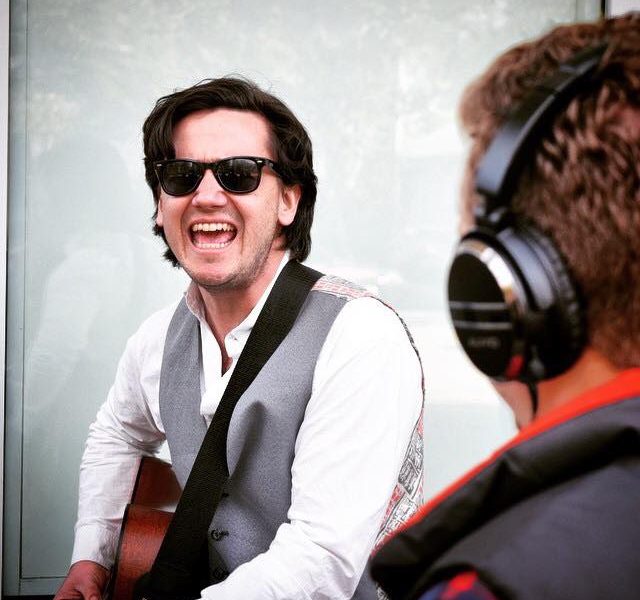

Today we’d like to introduce you to Jess Wilson.
Jess, please kick things off for us by telling us about yourself and your journey so far.
I think every musician has fond memories of their first instrument, their first years trying to learn to play music, and I was lucky enough to have music in my life from an early age. When I was only 4 or 5, my grandmother got me a toy store electric guitar that had its own amp and speaker installed in the body. My family tells me that I used to bang on the guitar and sing random songs standing on my stage (usually the fireplace), and it made my family laugh and cheer.
A few years down the road, I played the guitar loudly every single day. God love my parents; I am unable to comprehend how they put up with it. When I would learn a song, I would play the same riffs every day for weeks or even months until every little nuance of each guitar part was perfect. Within three years of practice, I was writing my own songs and had two spiral notebooks full of them I dare not show to anyone. It was not until my late 20’s that I ever performed a song that I wrote for a real audience.
I started playing with anyone who would let me sit in as soon as high school, Jamming with my friend Drew D’Entremont, playing rhythm guitar in a country band for my friend Kaitlin Kallmeyer, and my own cover band “Fade.” It was not until I was out of college that I got serious about getting my songs written, recorded, and published. This was likely the influence of a band I briefly played bass and banjo with, Michael Donner and the Southern Renaissance. Being around other songwriters helped me grow in my writing. I still to this day, have my own song ideas get stuck in my head, bothering me until I write them. Eventually, the Southern Renaissance relocated away from Houston, and after a short time, I started recruiting musicians to play again.
After about a year of dead ends with musicians and a multitude of new songs, the Jess Wilson Band was born. It took calling on some of my closest friends to make it happen, and we acquired a little rehearsal space to practice. We debuted at Fitzgerald’s on a downstairs bill back in 2015. I have now performed somewhere in the neighborhood of 150 concerts over the last five years. Since then, has been a whirlwind of writing, rehearsing, recording, playing shows, and juggling my career and personal life.
Can you give our readers some background on your music?
To write a song, I follow some advice I heard from Willie Nelson (not that I am a Willie caliber writer). Nelson once said something along the lines of: “For the most part, if a song comes to you, you will remember it. Later, I abandoned that method and realized that some ideas need to be written down, so as not to forget.” Songwriting to me means the guitar and I working out a progression and a vocal melody line. I then start cobbling together lyrics, do dozens of demos of the same song, exploring where it might go musically, trying different song structures, and hashing out what emotions I feel about the melody. I then listen back to the melody and craft the lyrics. I spend months on my lyrics, and my bandmates can attest that the lyrics are not set until the song is ready to be recorded. The band and I rehearse the song and vocal melody until everyone has a part that serves the song. Then we record, put art together, and if the budget is there, film videos, and promote.
Why? I have but two explanations. I get these melodies and certain musical ideas in my head, without provocation. I basically cannot stop writing. I used to write every day and should again. Secondly, I love performing live. I think anyone who is not terrified of speaking or performing in front of a crowd can understand that. There is a feeling I get when the song is going over (or at the very least, being performed well); I feel weightless. Still focused, my anxiety lowers and my vocal cords and diaphragm open up. It’s almost like a gentle breeze calming the body and soul. It took a lot of shows to get comfortable in my own skin. It took years. Of course, I still get a few butterflies before I walk on stage, but that’s part of the rush of it all.
The calming of body and soul is what art is about, no matter what your medium tends to be. Even if someone writes songs and no one hears them, they are still cathartic for the author. If you paint, write stories, sculpt, or write poetry (which I used to do all the time) then it is a manifestation of you and your emotions. It is you leaving something tangible behind which contains your sense of being.
Creating something that expresses your life force should be your goal if you want to express yourself through art. In sum, create something yourself. What would I like people to know about my music? Although I love to write and perform, the rest of the world of music is hard. Recording is difficult, rehearsals are long and sweaty and contentious, promoting is expensive and difficult, and booking is difficult. Keeping my band alive has been next to impossible. I’ve had five drummers, three bass players, six guitar players come and go from the band since I started it. You have to have a ton of perseverance and very few expectations to keep a good mindset.
Do you think conditions are generally improving for artists? What more can cities and communities do to improve conditions for artists?
There has not ever been a great time to be a touring musician much less an “Up and Coming” music artist. It is a hard life, and portions of that lifestyle are bittersweet. When you make your passion your livelihood, it may affect your art negatively. Today is no exception, but I do not necessarily feel that it is worse or better as the years have passed. On one hand, anyone can now put their music out on a digital platform. Then they at least have a reference point so that they can book shows and have somewhere to funnel their listeners.
I grew up in a time when MTV and major recording labels controlled stages and screens throughout this country. They had a monopoly on what most music fans saw on their TV, what albums they could buy, and who played clubs, concert halls, and stadiums. They still do to some extent, but now there are exceptions. This is why the grunge/gangsta rap/ and art rock thing in the early 90’s was able to flourish for a little while in the mainstream. It was some of the independent acts like Nirvana (formerly of Sub Pop before signing with Geffen), Soundgarden (formerly of SST before signing with A&M, then Interscope), Nine Inch Nails (formerly of TVT before signing with Interscope) all got signed to write and play their own music on major labels and then take on mainstream.
Later, groups like Neutral Milk Hotel (Merge) and Spoon were able to get national attention despite being on independent labels [Also worth noting that the success of Black Keys (Fat Possum), Arcade Fire (Merge), Fleet Foxes (SubPop – Bella Union), the Decemberists (Kill Rock Stars), and Death Cab (Sub Pop) were tied to this indie movement] often because of strategic vinyl marketing. This led to a platform for established indie music artists, due to unique internet marketing. Today, independent acts like Chance the Rapper and Cody Johnson, having come up without the help of any major record label, are not just two anomalies but a revolution in music.
Unfortunately, one of the other side effects of the internet was that people immediately began finding ways to stop paying for music. I am obligated to allow people access to my music; however, streaming services do not provide a reasonable amount of compensation or exposure to the artists who create the music and content. On the other side of the coin, local or independent acts today flood the web. There are hundreds of thousands of bands and artists. It is easy for acts to get lost in the mix, and it is easy sometimes for really poor acts to get shows and exposure that they would not otherwise receive. I truly feel that the listener taking ownership and buying music for themselves is an important part of the health of the entertainment industry. If I hadn’t spent my hard-earned allowance money on several albums (some which are now still favorites of mine), I would have never given hundreds of songs and dozens of albums a second or third listen. Thus comes the problem with streaming: when you can get it for free, you just do not appreciate it as much.
My advice for cities and communities is to hold up their local talent and boast about it the way you would if you were posting an Instagram story at your favorite touring band’s concert. Once your favorite local acts move onto touring, keep up with them and support them any way you can. I think that SoFar is one of the building blocks to that future. I just took in my first SoFar in Houston a couple of weeks ago, and it made me emotional to see a group of people watching live music and actually showing some respect to the artist and engaging on a human level. It is almost like a re-education for audiences in the digital age.
What’s the best way for someone to check out your work and provide support?
1. Attend one of my shows and bring your friends.
2. Purchase my music directly from iTunes or Amazon.
3. Buy merchandise.
5. To a lesser extent, visit my streaming presence through YouTube, Spotify, Bandcamp, google play, apple music, SoundCloud, or pandora.
6. Engage with my social media online. Instagram @Jesswilsonband or Jess Wilson Band of Facebook @jesswilsonmusicgroup
7. Download my yet unreleased singles from my next record, when they are released in 2019 through iTunes and Bandcamp.
Bandcamp:
https://jesswilsonband.bandcamp.com/
Contact Info:
- Website: http://jesswilsonband.com
- Instagram: @jesswilsonband on Instagram
- Facebook: https://www.facebook.com/pg/JessWilsonMusicGroup/
- Twitter: https://twitter.com/jesswilson85
- Other: https://www.youtube.com/channel/UCRNoGkryIaAa_E31UIiJvKw






 Image Credit:
Image Credit:
Javier Paredes, Jr. (Personal photo), Michael Allmon (close up photo of band faces), Earl Dittman
Suggest a story: VoyageHouston is built on recommendations from the community; it’s how we uncover hidden gems, so if you or someone you know deserves recognition please let us know here.












